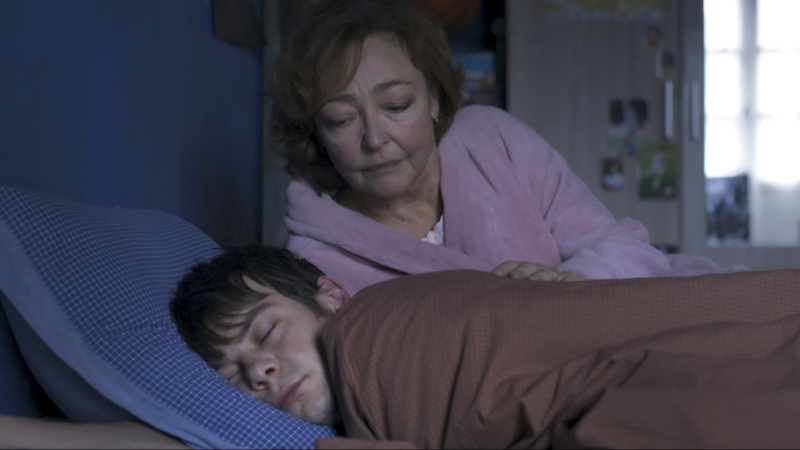A young man’s homecoming sets off erotic shockwaves in this unsettling French thriller
There have been countless movies about people heading back home after some time away and getting a less-than-friendly reception. Some of these characters are just searching for a little peace and quiet, like the ex-boxer, played by John Wayne, who returns to his Irish roots in John Ford’s classic The Quiet Man. And then there are those like Charlize Theron‘s misanthropic writer in Young Adult, who blows back into her suburban hometown looking to stir up trouble.
One of the pleasures of Alain Guiraudie’s thriller Misericordia is that you’re never quite sure which camp its protagonist falls into. Jérémie, played by Félix Kysyl, is a man of about 30, and he’s hard to figure out — raffishly handsome, but with something cold and inscrutable in his blue-eyed gaze.
As the movie begins, he’s driving to a tiny French village called Saint-Martial, nestled in a hilly, densely wooded countryside where residents go on long walks and forage for mushrooms. Jérémie has come back for the funeral of his former employer, a baker, who’s just died at the age of 62.
Jérémie stays with the baker’s widow, Martine — she’s played by the great French actor Catherine Frot, and she’s open-hearted and welcoming, allowing Jérémie to stay on for a bit after the funeral. Rather less hospitable is her son, Vincent, who lives nearby with his wife and son, but drops by his mom’s house often, each time making it clear that Jérémie is overstaying his welcome. The two men have some unfinished business; they used to be friends, and there’s a homoerotic undercurrent to their thinly disguised hostility.
Whatever might have happened between Jérémie and Vincent is never spelled out. But what makes Misericordia so unsettling — and also so darkly funny — is its belief that we all walk around carrying our share of latent, inconvenient desires.
Guiraudie is a leading figure in European queer cinema who’s best known for his 2013 gay-cruising thriller, Stranger by the Lake. That movie was a tightly honed exercise in suspense; for all the sun-drenched nudity, it threw off an icy Hitchcockian chill. Since then, though, Guiraudie’s work has gotten looser, weirder and more brazenly out-there, cutting across boundaries in terms of tone, genre and sexuality. His films are full of gay, straight and often cross-generational romantic pairings — indeed, his fascination with May-December encounters may be the most taboo thing about his work.
In Misericordia, Jérémie has no shortage of potential lust objects; he flits from one erotic possibility to another with a callous lack of investment. He seems to have had a thing for his former boss. He hits on a burly older friend who violently rebuffs him — at least initially. There’s also a village priest skulking about, played by a hilarious Jacques Develay, who seems to know all Jérémie’s secrets — and harbors a few of his own.
Misericordia becomes a small-town murder mystery of sorts, complete with dead body, cover-up and police investigation. But this isn’t one of those puzzles where the truth comes tumbling out in a sudden flurry of flashbacks and revelations. Guiraudie doesn’t have much use for the past; he’s interested in how his characters respond in the here and now. Misericordia knows exactly what it’s doing and also seems to be making itself up as it goes along. It’s meticulous and smart, but it’s also spontaneous and alive.
The title is the Latin word for “mercy,” and as with so much here, it’s shrouded in ambiguity. Jérémie receives more than his share of compassion from others, like Martine, who is ludicrously patient with him, and the priest, who, in one example of the movie’s topsy-turvy moral logic, insists on confessing his sins to Jérémie.
Guiraudie himself grew up in a small town in southern France, and he clearly loves telling stories set against wild and evocative landscapes, where anything can happen. Jérémie is clearly drawn to this place, too. For all its impish humor, Misericordia turns out to be an entirely sincere portrait of a small town where bakeries, farms and a whole way of life are on the verge of disappearing. Perhaps making this movie was Guiraudie’s own small act of mercy — a reminder for Jérémie, and the rest of us, that sometimes, maybe you can go home again.
New York Giants hire John Harbaugh as coach after identifying him as their top choice
Harbaugh joins the Giants 11 days after he was fired by the Baltimore Ravens. The Super Bowl champion is now tasked with turning around a beleaguered franchise.
US launches new retaliatory strike in Syria, killing leader tied to deadly Islamic State ambush
A third round of retaliatory strikes by the U.S. in Syria has resulted in the death of an Al-Qaeda-affiliated leader, said U.S. Central Command.
NASA rolls out Artemis II craft ahead of crewed lunar orbit
Mission Artemis plans to send Americans to the moon for the first time since the Nixon administration.
Trump says 8 EU countries to be charged 10% tariff for opposing US control of Greenland
In a post on social media, Trump said a 10% tariff will take effect on Feb. 1, and will climb to 25% on June 1 if a deal is not in place for the United States to purchase Greenland.
‘Not for sale’: massive protest in Copenhagen against Trump’s desire to acquire Greenland
Thousands of people rallied in Copenhagen to push back on President Trump's rhetoric that the U.S. should acquire Greenland.
Uganda’s longtime leader declared winner in disputed vote
Museveni claims victory in Uganda's contested election as opposition leader Bobi Wine goes into hiding amid chaos, violence and accusations of fraud.






